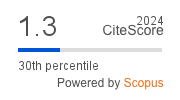Allergic asthma in children: Inherited, transmitted or both? (The transmission of periodontopathic bacteria concept)
Vol. 42 No. 3 (2009): September 2009
Articles
September 1, 2009
Downloads
Pradopo, S., & Utomo, H. (2009). Allergic asthma in children: Inherited, transmitted or both? (The transmission of periodontopathic bacteria concept). Dental Journal (Majalah Kedokteran Gigi), 42(3), 151–156. https://doi.org/10.20473/j.djmkg.v42.i3.p151-156
Downloads
Download data is not yet available.
- Every manuscript submitted to must observe the policy and terms set by the Dental Journal (Majalah Kedokteran Gigi).
- Publication rights to manuscript content published by the Dental Journal (Majalah Kedokteran Gigi) is owned by the journal with the consent and approval of the author(s) concerned.
- Full texts of electronically published manuscripts can be accessed free of charge and used according to the license shown below.
- The Dental Journal (Majalah Kedokteran Gigi) is licensed under a Creative Commons Attribution-ShareAlike 4.0 International License

















